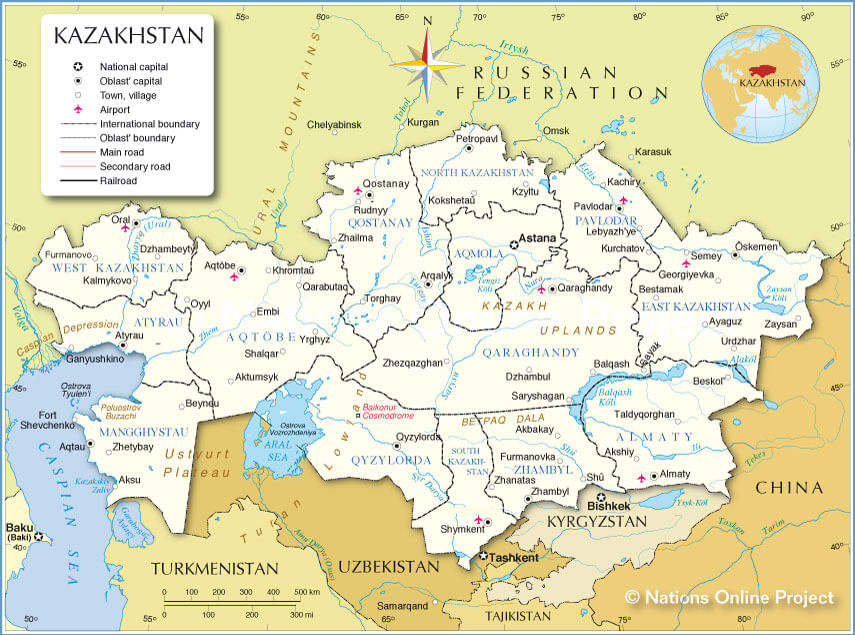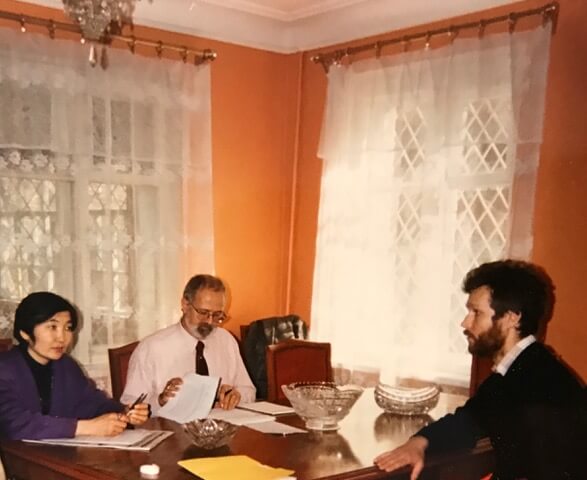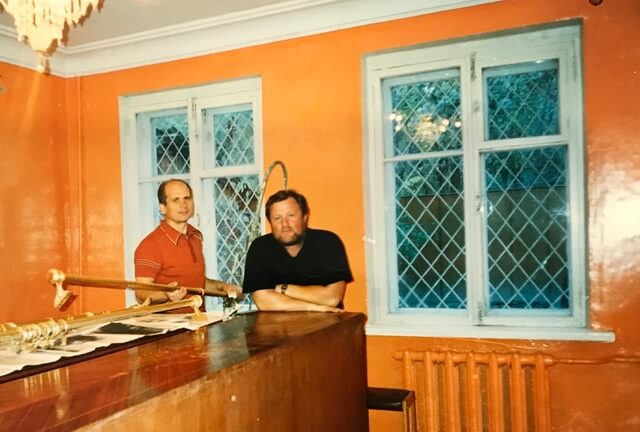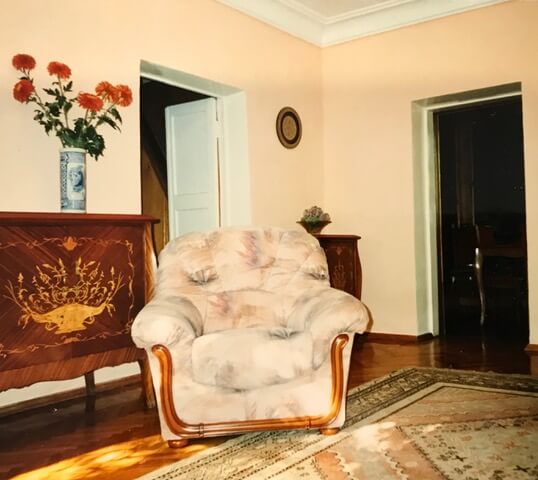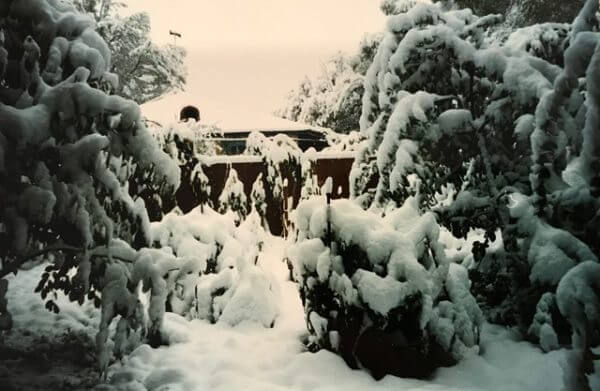#34: Kazakhstan, 1995-1996
Almaty Challenges:
Painting the Zal, Plus Climate, Cars and Cats
Living overseas always presents challenges and the fulfillment of meeting them. Here are a few we wrote home about while living in Almaty.
[Click on photos to enlarge.]
1995: Painting the Zal
October 18
We’re hoping to repaint the living room (zal in Russian) in the wonderful color which “sold” the house for us last spring — a warm, cozy coral for Central Asia’s long winter.
November 1
While R’s away on a business trip, Valodya, driver Sasha and I are painting the zal. You probably recall the trials of finding paint and pigment which turned out too bright and shiny. Landlord Sasha bought marine enamel, having been told it was longer-lasting! (What kind of international distributor would promote marine paint in landlocked Kazakhstan???) I eventually managed to find imported primer and white matte paint here and took advantage of our R&R trip to Rome to buy lots of red and yellow pigment.
[Almaty, Kazakhstan was considered a hardship post, so a standard clause in foreigners’ contracts provided two airplane tickets to a “modern” city for Rest-and-Recuperation — in our case, to Rome.]
Turns out we still didn’t have enough pigment. We’ve gone from one extreme to another. Instead of the warm apricot I wanted, we’ve got apricot sherbet, a very pretty pastel, but not in keeping with the strong hues of the rest of the house. C’est la vie and Takova zhizn (same meaning in Russian). I can live with this color better than I can with shiny orange, so that’s it for the duration.
[L to R: Office manager Roza, Russell and landlord Sasha with original color; Friends Valodya and Sasha preparing to cover the shiny orange; Pastel sherbet instead of warm coral]
Valodya and Sasha showed up at 8:30 on Saturday, and we worked together until after dark. That morning, we removed furniture, covered what couldn’t be removed with plastic, brushed on the primer, then mixed pigment and paint by hand. After a lunch of coq au vin, ratatouille, fresh potatoes from Valodya’s dacha, cookies and fruit, we settled down to paint the first coat. I got to do the radiators. If I never paint another radiator, that’ll be just fine. Even if painting radiators becomes one of the keys to heaven, I’d really have to think about it. We finished around 7:30, and the guys went home for the night.
(By the way, if you think coq au vin was a bit much for the occasion, keep in mind that all meat here is extremely tough, so it always gets stewed in some kind of alcohol in my house.)
Sunday, they arrived at 10 a.m. for the second coat. We finished while there was still some daylight, and I gave the guys the leftover white paint and primer.
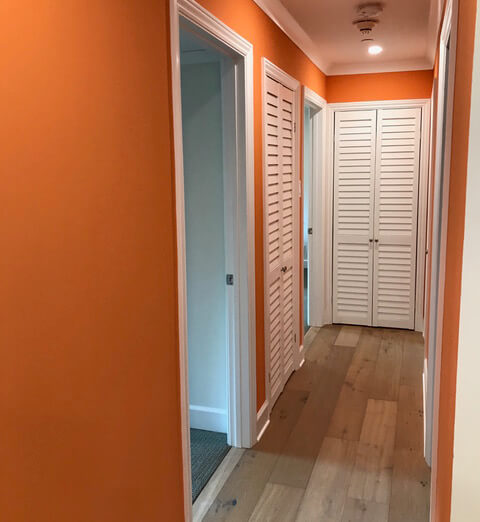 They both seemed thrilled and said they’d never seen such paint before. Actually, by U.S. standards, it’s second-quality, but by local standards, it’s really the cat’s pajamas. They each got about a gallon of white matte and a half-gallon of primer. I’ve got a half-gallon of apricot-sherbet in case of accidents, etc. You may think I bought too much paint, but the rule-of-thumb here is to buy more than you think you’ll need in case you haven’t got enough. The stores usually import one load of stock, and that’s it for months. So if there’s a problem, you can’t run back and buy more.
They both seemed thrilled and said they’d never seen such paint before. Actually, by U.S. standards, it’s second-quality, but by local standards, it’s really the cat’s pajamas. They each got about a gallon of white matte and a half-gallon of primer. I’ve got a half-gallon of apricot-sherbet in case of accidents, etc. You may think I bought too much paint, but the rule-of-thumb here is to buy more than you think you’ll need in case you haven’t got enough. The stores usually import one load of stock, and that’s it for months. So if there’s a problem, you can’t run back and buy more.
[Decades later, when I came to write this post, I glanced up at our hallway and realized it was, perhaps, an homage to the lost coral of our Almaty zal.]
Climate
Hot and dry in summer, cold and snowy in winter, Almaty’s climate was full of challenges, rarely helped by the business or government milieu. Here’s a year’s worth of samples.
1995
March 22
When entering a house here, whether it’s Russian or Kazakh, you take your shoes off. Makes sense in a country where shoes are often soiled by mud, dust or snow. At this time of year, most houses are warm so your toes don’t freeze — the entire city is heated by one central heating plant which disburses heat to every housing unit in town. If there aren’t too many guests, the host(ess) provides felt slippers to put over your socks. If there are lots of guests and you arrive too late, you just walk around in your socks (although some local ladies carry knitted slippers in their purses for just this eventuality).
April 3
Spring seems to have come. I say “seems,” because we can get snow here as late as May. In the meantime, all houses and apartments are too hot because of the citywide central heating. Neither our building nor our apartment (nor our house when we’re there during the renovations) has a thermostat, so you just live with it. The authorities turn the heat on and off on arbitrary dates, regardless of weather. They don’t turn it down at night, so even in winter it’s hotter and consequently drier than we would like for sleeping. Right now, everyone has balcony doors and kitchen windows open, trying to ameliorate the temperature.
April 12
They turned the heat off! We got our first good night’s sleep in some time. If there’s a cold snap, we may suffer, but we’ll cross that bridge when we come to it.
Most people have electric space heaters for when the authorities turn the heat off, fail to turn it on in the fall, or when the heat just goes off for some inexplicable reason. The authorities never explain. Last year, the inexplicable reason was that Kazakhstan didn’t have enough money to pay Uzbekistan for gas, so Uzbekistan cut off Kazakhstan’s supply.
Yesterday, I bought space heaters for the new house. I’d previously made a tour of all the shops to discover what was available. Now, I was just going back to buy the heaters and take them to the house. Ah, but it’s Almaty, and life is never so simple.
[A multi-paragraph tale followed, similar to those I’ve shared in earlier posts, about trying to find the warehouse after the store didn’t have the heaters in stock, eventually arriving to find it closed, etc. etc.]
July 6
Summer has brought a glut of flying insects. Valodya spent the better part of yesterday tacking bright blue plastic screening on the small window panes that open. (Blue plastic is all there is: take it or leave it, baby.) We didn’t have enough screening, so driver Sasha and I spent three hours in search. An extremely long story short, there’s none anywhere. We’ll have to be content with screening on a few small window panes and hope for a change in stores’ stock before the hottest weather arrives. Meanwhile, a.c. is practically nonexistent, and chocolate melts in the shops.
October 10
Fall has come to Almaty. There’s serious snow in the mountains. Down here, our peony stalks are drooping. Squash leaves have fallen to the ground. Beans have dried on their vines, and tomatoes are giving their last gasp. The hydrangea blossoms are turning darker, and I’m cutting and drying them for a winter bouquet.
We don’t get much fall color — only a sort of yellow-brown-gold, and then the leaves fall. No reds and russets like we West Virginia folk grow up with.
Rain started during the night, continuing off and on throughout the day. During one of the lulls, I ran out and harvested the black beans so they wouldn’t go moldy. Shelling them took over an hour, but it’ll be worth it this winter when I make black bean soup and black beans with rice.
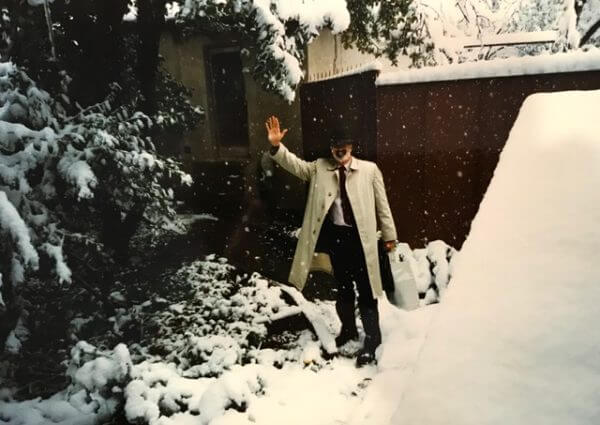 October 18
October 18
It’s snowing. We went to bed last night with rain and woke up inside a snowstorm. It’s snowed for about 12 hours and may finally be ending.
A lot of fruit remains on trees, and many of us still have garden crops. I’d planned to harvest herbs for drying today. I went out and scooped back the snow enough to cut some parsley and sage. Fortunately, the temperature didn’t go below freezing, so they seem to be all right. But we can kiss the fragile things goodbye.
Because the temperature is relatively high, the snow is very wet, so trees and power lines are crashing. Our phone was out for most of the morning, and much of the city had no electricity. If it freezes tonight, as everyone expects, the roads will be glares of ice tomorrow.
October 24
All of Almaty spent a cold weekend. The snow and colder temps strained the city’s heating system. Officials responded by giving everyone enough heat to stay alive, but not enough to be comfortable. Gas pressure went way down, as did electrical power. We were sitting in 50° F amid dim, flickering lights for three days, wondering if this is what winter is going to be like. No hot water because low gas pressure caused the pilot to go out. We had to heat every speck of water we needed on the stove. No baths. Difficult to get water to boil.
Dear friend Valodya arrived Monday morning, talked things over with landlord Sasha and got the auxiliary propane system working. Thanks to Valodya’s “golden hands” (as the Russians say), we had heat and hot water by late afternoon. I spent 30 minutes in the tub this morning, luxuriating in hot water from the tap.
[The following year, when conditions were even worse and Sasha was reluctant to use the auxiliary system, office manager Roza scolded, “You’re charging New York rent and giving Almaty service!”]
Problem #1: Where to hang laundry now that I can’t dry it outdoors. Problem #2: Waking up with scratchy throats due to dry winter air. I finally managed to put two-and-two together: Wash a load a day and hang it in the bedroom on our fold-out drying stand. Voila! The air is humidified, and our scratchy throats have disappeared.
November 23
It’s dark when we get up in the morning, and night falls early. The sun is never high in the sky, and all our houseplants lean eagerly toward the windows. The house is always on the cool side, and we carry an electric heater from room to room. At night, our down comforter and feather bed feel really welcome as we climb between flannel sheets, wearing flannel “nighties.”
December 7
January and February are the two severest months. We’re all holding our collective breath until March brings hints of spring. Interestingly, there are no snow shovels. People brush the snow away with huge, hand-made brooms that look like those witches ride. Or they use light-weight wooden scoops which appear too fragile to be much good.
December 14
After three days of intermittent snow piling up over two feet, the skies cleared, and as usually happens in that situation, the thermometer plummeted — to -20°C [-4°F]. The gas pressure’s down, so the house is cold again.
1996
February 1
A pretty tough week with black-outs and brown-outs on the electricity front, low gas pressure on the heating front and no hot water. The house got so cold, I huddled under a comforter all day, reading, with the cat to warm my feet.
I now appreciate why folks used to take only a Saturday-night bath. If you’ve got to heat the water on the stove and carry it to the tub, you’re not so keen to do it everyday. Fortunately, the cold and low humidity mean you don’t need a bath as often as you might. What a contrast: in hot and humid Laos, we used to take a minimum of two showers daily.
February 15
On Sunday, it was April. On Monday, December. Sunday’s spring-like temps and rains felt and smelled like April showers. I was worried our flower bulbs would get confused and sprout too early. That night, it began to snow, and the temperature plunged. By Monday evening, the snow stopped, and the roads turned to ice. So we’re back to winter with our fourth day of gray skies and intermittent snow. Although the city has turned into a silver-and-white fairyland, everyone is longing for the real spring.
February 22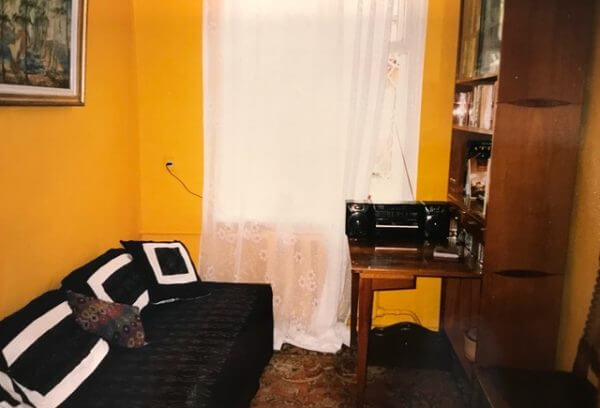 We still have no hot water. I’m not sure I remember what a real bath is like. We’re basically living in the smallest room with an electric heater and a comforter. We were even denied the heater on Saturday and Sunday when the electricity went out for more than 12 hours. I can happily report that a comforter is warmer with two under it than with one. Everyone in the city is experiencing the same energy problems, and we’re all hoping for the start of spring. I keep telling myself, “Just one more month, just one more month.”
We still have no hot water. I’m not sure I remember what a real bath is like. We’re basically living in the smallest room with an electric heater and a comforter. We were even denied the heater on Saturday and Sunday when the electricity went out for more than 12 hours. I can happily report that a comforter is warmer with two under it than with one. Everyone in the city is experiencing the same energy problems, and we’re all hoping for the start of spring. I keep telling myself, “Just one more month, just one more month.”
[So endeth the climate review of our first year in Almaty. It continued snowing off and on that spring into April with recurring energy problems.]
Cars
Readers have probably noted that I depended on driver Sasha and his car in Almaty. That wasn’t a luxury but a necessity. Owning a private vehicle presented all sorts of challenges including high purchase price and import taxes with uncertain supply. Our best bet was to buy a used one from a departing foreigner. Our preference was for a Niva (the Russian Jeep), export-quality rather than the poor quality produced for internal consumption.
1995
July 27
You may recall we made a deal with a departing U.S. Embassy official to buy his Niva when he left. All this happened last March, not long after we arrived. About once a month, whenever Russell saw the guy, he’d reconfirm the arrangement. Long story short, Russell phoned to check on when the handover would occur, knowing the man was leaving any day now. Bottom line: he’s already sold it to his successor with no explanation and no apology. Everyone who knows about this is shocked and appalled, but there’s nothing anyone can do, so we’ve got to start all over again. It’s especially disappointing because we wanted 4-wheel drive so we could go hiking in the mountains. We’ve already missed half the hiking season waiting on this guy, and now who knows how much longer it’ll take.
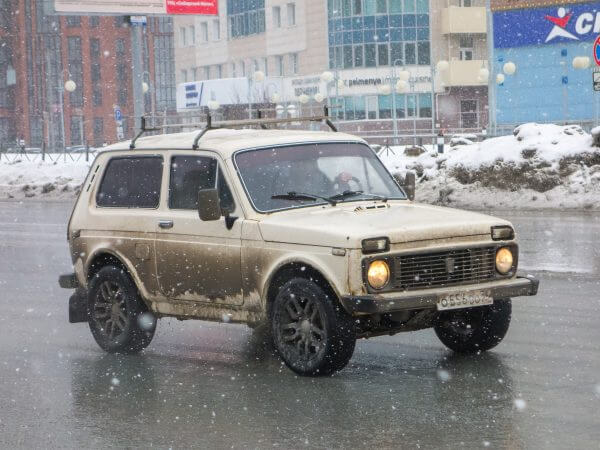 Sept. 5
Sept. 5
We’re still hunting for a car. We heard about a Dutch firm with export-quality, used Nivas for sale from their fleet. Since there’s virtually no snow removal here except on main streets, 4-wheel drive is essential. We went with driver Sasha and Valodya to inspect these vehicles and even found one that we all liked — only a couple of years old, in good condition, needing a new battery and other minor things. Hooray! Our problem is finally solved. Nope: it’s registered in Russia, and it would take up to 6 months to change the registration.
November 13
We may be on the track of another Niva. It sure would be nice to be able to run around on weekends and evenings without having to disrupt our drivers’ home life.
December 7
A Niva has come to live in our garage. Finally, six months after our first effort fell through and ten months after our arrival, we have a family car.
The local men were amazed that I drove it home AND into the garage. Most women here not only don’t drive, they ride in the back seat, even if the front seat is empty! This applies to both Kazakhs and Russians. In fact, there’s a great deal of male chauvinism here, often remarked upon by foreigners. It’s assumed that I can’t do a great many things that most American women never give a moment’s thought about being able to do. So much for gender equality under communism.
[Despite buying a Niva, we both continued to have a car and driver during weekdays. Driving in Central Asia was precarious at best because of drunk drivers, frequent accidents, low incidence of insurance, difficulty in finding safe fuel and being constantly stopped by police.]
1996
February 15
Last Tuesday, the doorbell rang unexpectedly at 9 p.m. — Sasha and Oksana, one of the young women who work at the office. Oh dear, we thought, there’s illness or accident in Sasha’s family, and he’s brought along Oksana to translate. But he’d come to explain that he’d been offered a permanent job with a Portuguese firm which is opening offices in Almaty, and they wanted him to start the next day. He added that his friend, Talgat, could take over as my driver. It was bad news for us, because Sasha has become like a brother, and we’ll miss having him in our daily lives. But we’re extremely happy that he’s found a permanent job, especially because our project will be winding down in the next ten months.
Talgat and I are having a month’s trial. He’s doing an excellent job on our currently treacherous roads, and he’s a nice fellow too. I expect we’ll be together from now on.
[And we were.]
Cats
Just about everywhere we’ve lived, we’ve had pets. The usual practice was to take in a cat and/or dog from a departing foreigner and give them a home until passing them on. It wasn’t long after we moved into our house that we began looking for a pet.
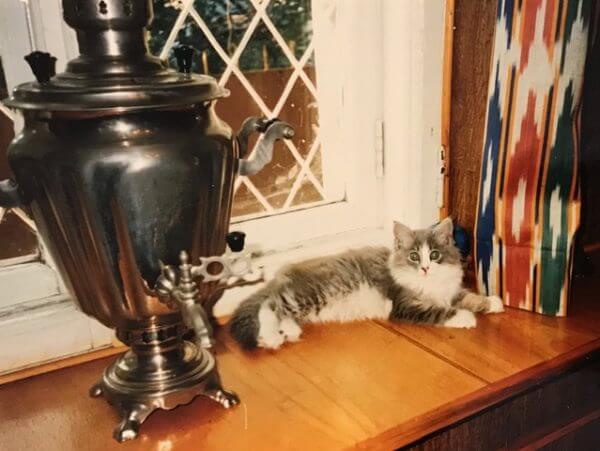 1995
1995
June 29
We now have a little koshka living at our house — a gray-and-white Persian who sometimes answers to the name, Kitten Kaboodle. She’s pretty, intelligent and full of P&V, so that’s how she got her name: she’s the whole kit and kaboodle!
July 6
Kitten Kaboodle continues to do well. She’s growing by leaps and bounds and learning the house rules. Because kitty litter costs over $15 for a small bag, we’re using uncooked rice which is much, much cheaper. Once she got over the shock of doing her business in rice (which soaks up the urea quite nicely, thank you), she seemed content to use her litter box (also $15).
October 10
How to wash a muddy, long-haired cat who loves being outside: Take cat into bathroom. Shut door. Take up bath mat. Put old towel on floor. Fill bathtub with five inches of warm water. Put cat in water. Get out of the way when she gets mad. Put her back in tub. Get out of the way. Repeat several times. Run out of bathroom and close door. Return after one hour. Clean up tub and floor. Pick up decontaminated cat and tell her what a good girl she is.
[Her double-barreled name became too cumbersome, and we gradually began calling her “Koshka.” In midwinter, we took a “sun break” to Thailand’s Pan Sea Hotel (earlier visit described in Post #24). Russell returned to Almaty after a week, while I did some shopping for much-needed items in Bangkok.]
1996
January 25
[While I was away], poor Russell had to suffer through Koshka’s first heat — yowling and screaming inside the house while the tom cats prowled and yowled outside. Fortunately, she got over it in a couple days, and we can think about the risks of sterilization in Almaty, the main problems being lack of anesthesia and abysmal hygiene in vet facilities.
February 15
Koshka has decided to use her litter box only when she has to; e.g. when we’re both away, and she can’t get out. Sunday, in the unseasonable, spring-like rain, she spent most of the day outdoors, refusing to come in until it was almost dark. Then in she came — muddy, bedraggled and very pleased with herself. She got thrown into the bathroom until she cleaned her pleased little self up. Now, with winter returned, she streaks out, claws a place in the snow, rushes through her business and streaks back, shaking her freezing paws.
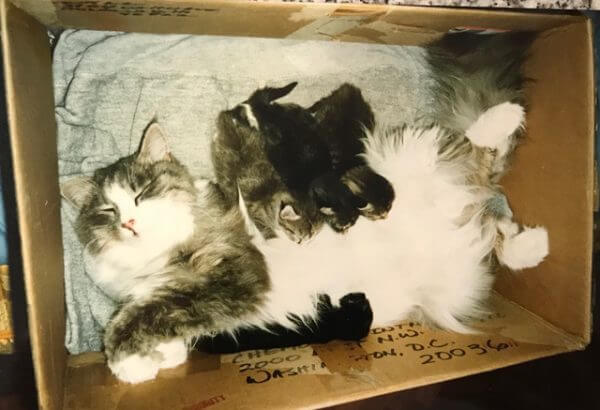 March 19
March 19
Last night, between 12:30 and 1:30 a.m., Koshka gave birth to four healthy kittens. In the middle of our bed! Russell was awakened by what sounded like the cries of more than one cat. He whispered to me, and we turned on a bed lamp. There was a tiny kitten calling out to its mama for a suckle. Over the next hour, three more were born.
We’d hoped to avoid this, but she seems to have gone into heat younger than the vet expected and was outside before anybody knew she was ready to conceive. All those Toms who were yowling in January may have been looking for another chance. Some weeks ago, we realized she was pregnant and resolved on trying to be good grandparents.
Although we’d prepared a birthing box, we felt it was a bad idea to disturb her while she was in labor, so we contented ourselves with putting a sheet of plastic between the bedding and the mattress and leaving her in peace. We washed the sheets once all four were born. Today I took the feather bed and comforter to the recently-opened French dry cleaner who indicated there’d be no problem in getting them clean.
The kittens are quite cute, even though they’re only a few hours old. We have one definite gray, like its mama. Then there are two dark-gray, tabby-striped ones, and a black one with white feet and face. It’s too soon to tell, but we’re hoping they’ll be long-hairs like their mom. I have always wanted a black cat with white feet and face, so I’m contemplating keeping that one as a companion for mama and giving away the other three when the time comes.
March 28
The babies are looking more like kittens now and less like drowned rats. After a hectic first 24 hours of frantically eating while nursing her young, mama cat now leaves the box for a break every hour or so. The kids are sleeping a lot and not feeding constantly, so she can get away for a well-deserved rest.
May 7
The kittens are little cats now, and today they ventured outside for the first time. Mama Cat still allows them to nurse now and then, and she’s exceedingly thin. Two of them will go to their new homes next Monday. That leaves two, one of which will stay with us, so we have to find a home for one more. We don’t think we’ll have too much trouble. It’s the cutest one — the black-and-white “tuxedo” cat — tho it’s also the dumbest. We’ve decided to keep the kitten that looks like a Maine Coon Cat rather than the tuxedo one as originally planned. The MCC has the livelier personality of the two, and that always did count for more with us than looks.
[That’s the story of how Kitten Kaboodle became Koshka became Mama Cat. Her story goes on for many more years and across two continents. Stay tuned…]

COMING NEXT MONTH
Kazakhstan 1996
Floating Down the Ili River and
Trekking to Central Asia’s Grand Canyon

LET ME HEAR FROM YOU.
Please take a moment to share your thoughts.
Your comments help make the blog better, and I always answer.
* * *
If you enjoyed reading this post, I hope you’ll SUBSCRIBE by clicking on the button below. Every month, when I post a new excerpt from my life overseas, you’ll get an email with a link so you can read the next installment. Subscription is free, and I won’t share your contact information with anyone else. Your subscribing lets me know you’re reading what I write, and that means a lot.

